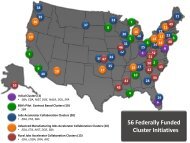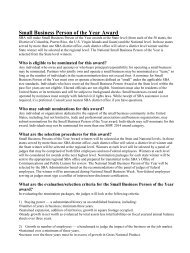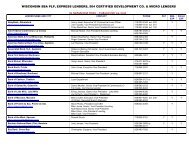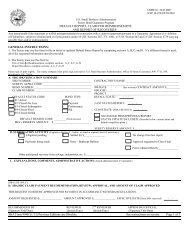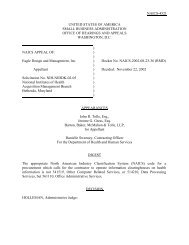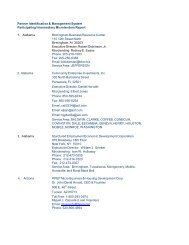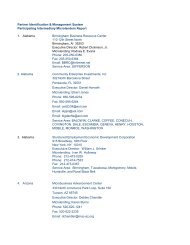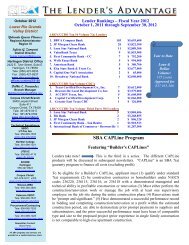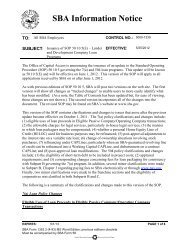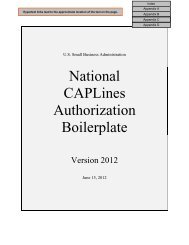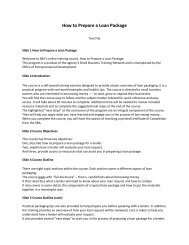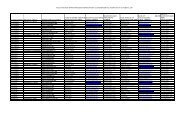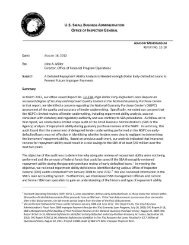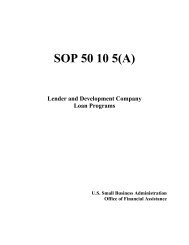Oklahoma Small Business Resource Guide - SBA
Oklahoma Small Business Resource Guide - SBA
Oklahoma Small Business Resource Guide - SBA
Create successful ePaper yourself
Turn your PDF publications into a flip-book with our unique Google optimized e-Paper software.
CONTRACTING<br />
who are socially and economically<br />
disadvantaged.<br />
There is a federal government-wide<br />
goal of awarding at least 5 percent of<br />
prime contracting dollars to SDBs each<br />
year. Large prime contractors must<br />
also establish a subcontracting goal for<br />
SDBs in their Subcontracting Plans.<br />
Firms self-certify as SDB without<br />
submitting any application to <strong>SBA</strong>;<br />
however, firms approved by <strong>SBA</strong> into<br />
the 8(a) <strong>Business</strong> Development program<br />
are automatically certified as an SDB.<br />
To self-certify, firms should update their<br />
CCR profiles and update their ORCA<br />
profiles, making sure that both profiles<br />
reflect their SDB status.<br />
SERVICE-DISABLED VETERAN-<br />
OWNED SMALL BUSINESS<br />
The Service-Disabled Veteran-<br />
Owned <strong>Small</strong> <strong>Business</strong> (SDVOSB)<br />
program has a federal government-wide<br />
goal of awarding at least 3 percent<br />
of prime and subcontracting dollars<br />
to Service-Disabled Veteran-Owned<br />
<strong>Small</strong> <strong>Business</strong>es each year. Large<br />
prime contractors must also establish a<br />
subcontracting goal for Veteran-<br />
Owned <strong>Small</strong> <strong>Business</strong>es in their<br />
Subcontracting Plans. These<br />
subcontracting goals are reviewed at<br />
time of proposal by both the contracting<br />
officer and <strong>SBA</strong> prior to the award of a<br />
contract.<br />
The SDVOSB Protest is administered<br />
by <strong>SBA</strong> to ensure that only businesses<br />
owned by service-disabled veterans<br />
receive contracts reserved exclusively<br />
for them. When a business’s SDVOSB<br />
self-certification is challenged, <strong>SBA</strong><br />
determines if the business meets<br />
the status, ownership, and control<br />
requirements.<br />
To determine your eligibility,<br />
contact your local veterans’ business<br />
development officer, visit the<br />
various program websites, or contact<br />
<strong>SBA</strong>’s Office of Veterans <strong>Business</strong><br />
Development at www.sba.gov/aboutoffices-content/1/2985.<br />
WOMEN-OWNED<br />
SMALL BUSINESS<br />
FEDERAL CONTRACT PROGRAM<br />
On October 7, 2010, the <strong>SBA</strong><br />
published a final rule effective February<br />
4, 2011, aimed at expanding federal<br />
contracting opportunities for womenowned<br />
small businesses. The Women-<br />
Owned <strong>Small</strong> <strong>Business</strong> (WOSB)<br />
34 — <strong>Small</strong> <strong>Business</strong> <strong>Resource</strong> OKLAHOMA<br />
Federal Contract program authorizes<br />
contracting officers to set aside certain<br />
federal contracts for eligible womenowned<br />
businesses and economically<br />
disadvantaged women-owned small<br />
businesses.<br />
To be eligible, a firm must be at least<br />
51 percent owned or controlled by one<br />
or more women. The women must be<br />
U.S. citizens. The firm must be “small”<br />
in its primary industry in accordance<br />
with <strong>SBA</strong>’s size standards for that<br />
industry. To be deemed “economically<br />
disadvantaged” its owners must<br />
demonstrate economic disadvantage in<br />
accordance with the requirements set<br />
forth in the final rule. For additional<br />
information, visit www.sba.gov/content/<br />
contracting-opportunities-women-ownedsmall-businesses.<br />
Large prime contractors must also<br />
establish a subcontracting goal for<br />
Woman-Owned <strong>Small</strong> <strong>Business</strong>es in<br />
their Subcontracting Plans. These<br />
subcontracting goals are reviewed at<br />
time of proposal by both the contracting<br />
officer and <strong>SBA</strong> prior to the award of a<br />
contract.<br />
WHAT YOU SHOULD KNOW ABOUT<br />
YOUR BUSINESS<br />
To be eligible to bid on a federal<br />
contract, you must know your<br />
business. Answer the following three<br />
questions:<br />
1. Are you a small business?<br />
Is your small business:<br />
• Organized for profit?<br />
• Located in the U.S.?<br />
• Operated primarily within the U.S. or<br />
making a significant contribution to<br />
the U.S. economy through payment<br />
of taxes or use of American products,<br />
materials, or labor?<br />
• Independently owned and operated?<br />
• Not dominant in the field of operation<br />
in which it is bidding for government<br />
contracts?<br />
• A sole proprietorship, partnership,<br />
corporation, or any other legal form?<br />
If the first six criteria apply to your<br />
business, ask yourself the second<br />
important question to find out if<br />
your business meets size standard<br />
requirements.<br />
2. What is the size standard for your<br />
business?<br />
Size standards are used to<br />
determine whether a business is small<br />
or “other than small.” Size standards<br />
vary depending upon the industry. To<br />
determine the size standard for your<br />
business, you will need a NAICS code.<br />
Every federal agency uses these codes<br />
when considering your business. To<br />
determine your NAICS code, go to<br />
www.census.gov/eos/www/naics/. Some<br />
<strong>SBA</strong> programs require their own<br />
unique size standards. To find out<br />
more about these requirements and<br />
other size standard information, go to<br />
www.sba.gov/size.<br />
3. Do you fall under a specific<br />
certification?<br />
Under the umbrella of “small<br />
business,” <strong>SBA</strong> has outlined several<br />
specific certifications that businesses<br />
may fall under. These certifications<br />
are divided into two categories:<br />
<strong>SBA</strong>-Certified and Self-Certified.<br />
The <strong>SBA</strong>-Certified Programs were<br />
created to assist specific businesses<br />
in securing federal contracts and<br />
therefore can only be issued by <strong>SBA</strong><br />
administrators. For the Self-Certified<br />
Programs, you can determine for<br />
yourself if your business meets the<br />
requirements by referring to the<br />
Federal Acquisition Regulations<br />
(FAR).<br />
Just as Congress has given federal<br />
agencies a goal of procuring 23<br />
percent of federal contracts from<br />
small businesses, so too must federal<br />
agencies meet specific contracting<br />
goals for other categories of small<br />
firms. These goals are:<br />
• 23 percent of contracts from <strong>Small</strong><br />
<strong>Business</strong>es<br />
• 5 percent of contracts go to <strong>Small</strong><br />
Disadvantaged <strong>Business</strong>es<br />
• 5 percent go to Women-Owned <strong>Small</strong><br />
<strong>Business</strong>es<br />
• 3 percent go to Service-Disabled<br />
Veteran-Owned <strong>Small</strong> <strong>Business</strong>es<br />
• 3 percent go to HUBZone <strong>Small</strong><br />
<strong>Business</strong>es<br />
Federal agencies have a strong<br />
incentive to fulfill these contracting<br />
goals. You should apply for those<br />
<strong>SBA</strong>-Certified and Self-Certified<br />
programs for which you qualify<br />
to take advantage of contracting<br />
opportunities.<br />
Visit us online: www.sba.gov/ok



